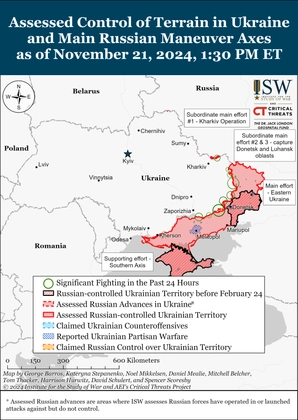Key Takeaways from the ISW:
- Russian President Vladimir Putin intensified his reflexive control campaign aimed at Ukraine and its Western partners by conducting an ostentatious ballistic missile strike against Ukraine that used multiple reentry vehicles on November 21.
- Putin explicitly threatened that Russia may attack Western countries that support Ukrainian deep strikes in Russia and rhetorically connected the November 21 ballistic missile strike to Russian nuclear capabilities - a marked intensification of an existing Russian information operation that aims to use explicit threats and nuclear saber-rattling to discourage continued Western military support for Ukraine.
- Putin’s November 21 statement demonstrates that Moscow’s constant saber-rattling largely remains rhetorical.
- Neither the Oreshnik ballistic missile strike nor Putin's November 21 statement represent a significant inflection in Russian strike capabilities or likeliness to use a nuclear weapon.
- The Kremlin continues to demonstrate its full commitment to use the prospect of "negotiations" with Ukraine and the West to pursue nothing short of the total destruction of the Ukrainian state despite Russian President Vladimir Putin's efforts to posture himself as amenable to peace negotiations.
- North Korean troops are reportedly training alongside Russian naval infantry and airborne (VDV) units.
- North Korea's ability to learn and integrate lessons from fighting alongside Russia is likely to be significantly degraded if the Russian military command uses North Korean troops in the same highly attritional infantry-led assaults that it uses most Russian personnel.
- Russian forces recently marginally advanced in the main Ukrainian salient in Kursk Oblast southeast of Sudzha.
- Ukrainian forces recently advanced north of Vuhledar. Russian forces recently advanced northwest of Kreminna, southeast of Chasiv Yar, in Toretsk, southeast of Kurakhove, northeast of Vuhledar, and likely advanced northeast of Velyka Novosilka.
- The Russian State Duma adopted a three-year federal budget with record defense expenditures from 2025-2027.
JOIN US ON TELEGRAM
Follow our coverage of the war on the @Kyivpost_official.
Authors: Angelica Evans, Christina Harward, Grace Mappes, Nate Trotter, and Frederick W. Kagan.
See the original here.
To suggest a correction or clarification, write to us here
You can also highlight the text and press Ctrl + Enter
You can also highlight the text and press Ctrl + Enter








